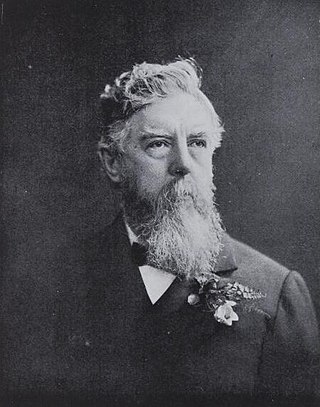Related Research Articles

Sir Richard Butler was an Australian politician. He was a member of the South Australian House of Assembly from 1890 to 1924, representing Yatala (1890–1902) and Barossa (1902–1924). He served as Premier of South Australia from March to July 1905 and Leader of the Opposition from 1905 to 1909. Butler would also variously serve as Speaker of the House of Assembly (1921–1924), and as a minister under Premiers Charles Kingston, John Jenkins and Archibald Peake. His son, Richard Layton Butler, went on to serve as Premier from 1927 to 1930 and 1933 to 1938.

Simpson Newland CMG, pastoralist, author and politician, was a pioneer in Australia who made significant contributions to development around the Murray River. He was also an author of practical works and novels.

Sir Henry Simpson Newland, was a distinguished Australian surgeon.
Rev. Ridgway William Newland, frequently spelled "Ridgeway", was an English Congregationalist minister who with his large family emigrated to the young colony of South Australia, where he had a considerable influence in the Encounter Bay district. Many of his descendants were important in the history of the State. He has been called "The father of the South".

Philip Mesmer Newland was an Australian sportsman who excelled at Australian rules football, cricket and lacrosse. He played Sheffield Shield cricket for South Australia as a wicket-keeper and toured England with the Australian Test team in 1905.

Sir William Herbert Phillipps, generally referred to as Herbert Phillipps or W. Herbert Phillipps, was a prominent South Australian businessman and philanthropist.
This is a list of related persons who have held positions in the two South Australian houses of parliament or represented South Australia in Canberra. It includes some notes on people with identical surnames but no clear family connection.
The Dutton family of South Australia was established by Frederick Dutton, who "rose to distinction" from modest origins in Norwich, Norfolk, to leave a number of descendants who became prominent in Australia.‘The family name was originally Mendes, but was changed by … Frederick Hugh Hampden Mendes to that of the family of the latter’s grandfather, who was descended from the Duttons, of Dutton, in Cheshire’.
Henry Rymill and Frank Rymill were brothers prominent in business and public service in the 19th century South Australia. Henry "Harry" Rymill and Francis "Frank" Rymill were born in England, sons of Robert Rymill and Louisa Rymill of Shepperton, and migrated to South Australia, arriving at Port Adelaide in the Caucasian on 1 October 1855. Their company H & F Rymill was a prominent financial institution well into the 20th century. Their families included a number of prominent Adelaide citizens.

Alfred Muller Simpson, invariably known as Alfred M. Simpson or A. M. Simpson, was a South Australian industrialist, a principal of the manufacturing firm of A. Simpson & Son. He was a member of the South Australian Legislative Council from 1887 to 1894.

Henry Edward Downer was a South Australian politician. He was a brother of Sir John Downer and George Downer, and a noted lawyer and businessman.
Robert Alfred Tarlton was a businessman and politician in the early days of the colony South Australia.
Edward Davies F.S.A.I.A. was an architect and arts administrator in South Australia.
William Hampden Dutton, generally known as Hampden Dutton, was a pioneering pastoralist in New South Wales and South Australia.

Henry Dutton was a pastoralist in South Australia, known as the "Squire of Anlaby". He was the father of Henry Hampden Dutton and a grandfather of writer Geoffrey Dutton.

Emily Dutton was a businesswoman, musician and socialite of South Australia, wife of Henry Hampden Dutton. She was for many years manager of Anlaby Station and managing director of Anlaby Pastoral Company.
Richard Francis Newland was a banker and politician in the colony of South Australia, appointed as an acting non-official member of the Legislative Council of South Australia, serving from January 1847 to July 1847.
Sidney Frederick Downer was a South Australian journalist and sports writer, a member of the prominent Downer family, who was for three years a Japanese prisoner-of-war.
Newland is a surname. Notable people with the name include:

Leslie Jefferis Tarlton was an Australian big game hunter and entrepreneur in British East Africa. He was the leader of numerous safaris, including the Smithsonian-Roosevelt African Expedition of 1909–1910.
References
- ↑ "Before the Public". The News (Adelaide) . Vol. XIX, no. 2, 866. South Australia. 24 September 1932. p. 5. Retrieved 8 August 2023– via National Library of Australia.
- 1 2 3 4 Jenkin, G. K. (1988). "Newland, Victor Marra (1876–1953)". Australian Dictionary of Biography . Vol. 11. Canberra: National Centre of Biography, Australian National University. pp. 10–12. ISBN 978-0-522-84459-7. ISSN 1833-7538. OCLC 70677943 . Retrieved 5 December 2022.
- ↑ "No. 29926". The London Gazette (Supplement). 30 January 1917. p. 1145.
- ↑ "No. 13355". The Edinburgh Gazette . 22 November 1918. p. 4277.
- ↑ "Victor Marra Newland". Former members of the Parliament of South Australia . Retrieved 5 December 2022.
- ↑ "Death of Mr. V. M. Newland". The Advertiser (Adelaide) . 14 January 1953. p. 3. Retrieved 2 December 2016– via Trove.
- ↑ Alick Downer The Downers of South Australia Wakefield Press 2012 ISBN 978 1 74305 199 3